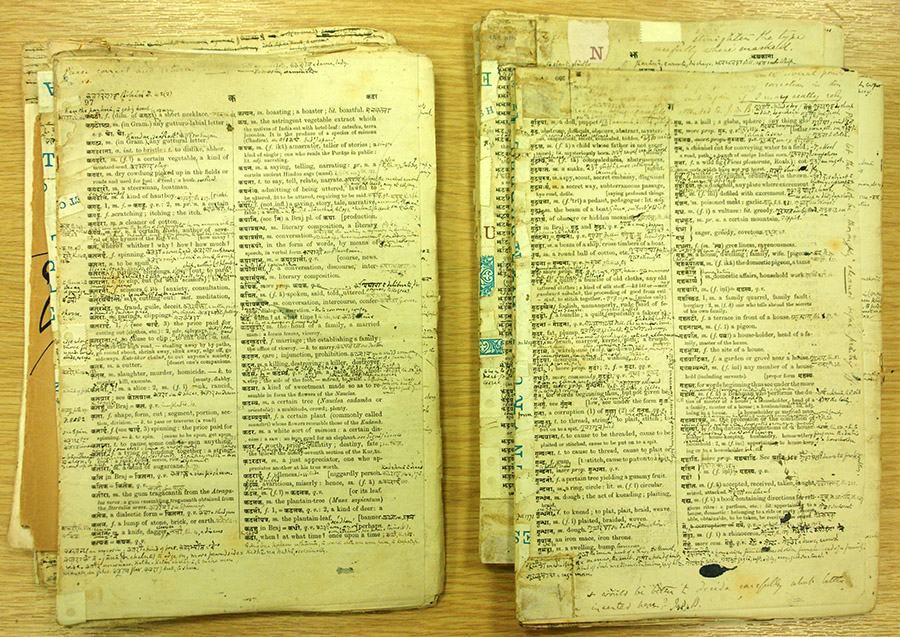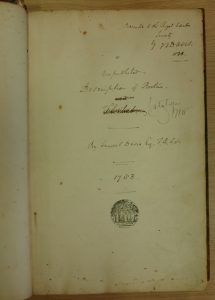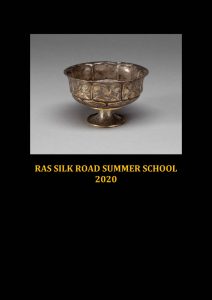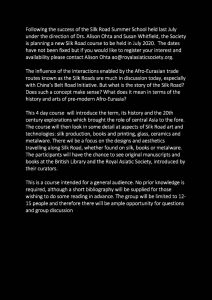What’s Happening in the Archives?
A new year and decade, and just over five years in post as archivist, I decided it would be a good idea to take stock of the progress in caring for the archives and some of the other collections, in order to assess what has been achieved and to consider a strategy forward. In that vein, I have begun compiling a report to identify and clarify the work that has been undertaken both by myself and by our many volunteers, interns and placement students, and to itemise what still needs to be done. I thought, in this blog, I would share with you the beginning of this report, so you would get a flavour of what is happening in the archives.
The position of archivist was created in 2014, and I commenced employment in October of that year. This is a part-time position, 3 days a week (0.6). After initial orientation, I began identifying the archives within the strong room and other store rooms. More that 250 boxes of various sizes were identified. Further acquisitions have increased the quantity of boxes including the Thomas Manning archive (4 boxes) and the Angus C. Graham archive (17 boxes) as well as acquiring some institutional archives from the Society’s offices. However some disposal has also occurred, for example, old cheque book stubs and bank statements. The boxes contained what would both traditionally be considered as archives and also the remaining objects within the collections. The contents of these boxes were all listed on to an Excel spreadsheet and each of the boxes given an identifying number.
Concurrently with listing of the boxes, cataloguing of some of the personal papers commenced. The first catalogue created on Archives Hub was for the Papers of John Drew Bate (1836-1923). Bate was not only an active missionary, but also interested in the wider culture of India and, in particular, the Hindi language. The strategy for each collection of papers to be catalogued is to undertake a ‘complete care package’. So items are given basic conservation treatment such as cleaning and flattening, put into archival folders and boxes as well as the actual cataloguing. Thus each achieved catalogue also means that these collections are also physically ready and accessible for researchers.

Since this first catalogue for personal papers, a further 64 catalogues for personal papers have been added to Archives Hub, both by myself and by volunteers and interns. Some of these are small – one or two items, or a single archival folder, such as the The Papers of Samuel Davis which is a single bound volume of his “Unpublished Description of Bootan”.

However some are much larger, including the papers for Brian Houghton Hodgson, Horace Geoffrey Quaritch Wales, Edward William West and Thomas Manning. Some papers have benefited from previous partial lists which helped in creating the final catalogue.
Currently work is being undertaken on four sets of personal papers. I am working on the papers of Francis Buchanan-Hamilton as mentioned in last week’s blog post. I am also working with the papers of Angus C. Graham to organise them ready for cataloguing. Two volunteers are working on the papers of Dennis Duncanson, and on the combined papers of Arthur Anderson, Clement, Edward William, Henry, and Walter West. Papers still needing attention include those for Charles A. Storey and Henry Creswicke Rawlinson, for which box lists are available.
The archives do not just consist of Personal Papers, but the progress of the other material will wait for a further blog post…
And, of course, the Society is not just about the Collections. Last week the opening of the Bayly Prize for 2020 was announced with a deadline for application on 17 April 2020. This week we would like to announce the forthcoming Silk Road Course for 2020.


We would also like to advertise the latest Royal Asiatic Society Book, published in conjunction with Routledge. “Islamic Movements in India: Moderation and its Discontents” by Arndt Emmerich analyses the emerging trend of Muslim-minority politics in India and illustrates that a fundamental shift has occurred over the last 20 years towards an inclusive debate centred on socio-economic marginalisation and minority empowerment. Arndt Emmerich is a Research Fellow at the Max Planck Institute for the Study of Religious and Ethnic Diversity, Gottingen, Germany and a Research Associate in the Department of International Development, University of Oxford.

Finally, we have two upcoming lectures. On Thursday 13 February, 6.30 pm. Dr Simon O’Meara (SOAS) will lecture on “The Ka’ba of Mecca as axis and matrix mundi”, and on Tuesday 18 February, 6.30 pm, Dr Fiona Kerlogue (Former Deputy Keeper of Anthropology, Horniman Museum) will lecture on “Travelling and Collection in the Dutch East Indies in the 1930s: the collections of Růžena Charlota Urbanová in the National Musuem, Prague”. We hope that you will be able to attend one or both of these lectures. Further details are available on our website.
